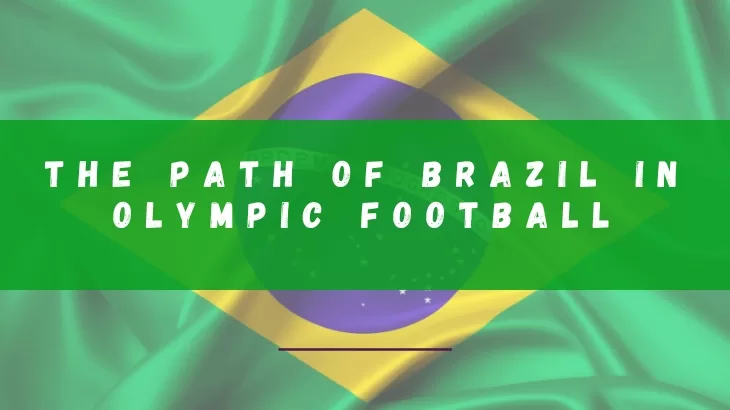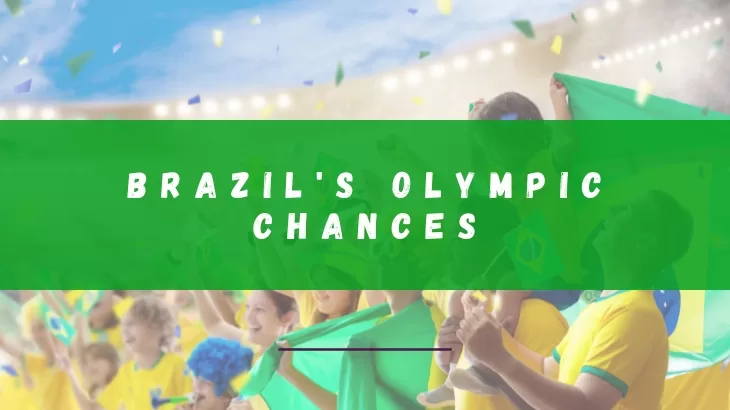Reaching a Different Legacy: The Eternal Love of Brazilian Olympic Football
The World Cup was not the only time Brazil demonstrated an insatiable appetite for football, forever in demand throughout their Olympic history. An ongoing example of this fervor is the Brazilian Olympic football team, with a history older than most nations and always aiming to inspire future generations. The journey to Olympic greatness is one that has seen incredible highs, significant lows and a tireless demand for perfection.
The path of Brazil in Olympic football

First Repertoire and However Signings
Brazil’s first two ventures into Olympic football matches provided mixed results. While in the early years, there was no guarantee worldwide success would come quickly on a consistent basis However, the seeds were being sown for future success with an emphasis on blossoming youth and a will to win.
Which was the first real participation of Brazil at Olympic football, not far past group-state. The importance of this early exposure to international competition was later reflected in the team’s philosophy and understanding of world football.
A Breakthrough and Stardom
It was only in the 1980s that there began to be real progress and Brazil started regularly impressing at Olympic football. This moment came at the 1984 Los Angeles Olympics as they reached their maiden silver medal. This led the way for further successes and marked Brazil as a serious contender in Olympic football.
Brazil performed admirably on the world stage at the 1988 Seoul Olympics as well, reaching another final and claiming a silver medal. Those campaigns which saw players like Romário and Bebeto leave their mark on the event highlighted how much talent Brazilian football had to offer.
Continued Pursuit of Gold
From then onward the Brazilian pursuit of an Olympic gold medal became a national passion and Brazil fielded competitive teams in all future tournaments. It was a fresh-faced Ronaldo and Rivaldo that helped guide Brazil to Olympic bronze at Atlanta 1996. Though they didn’t win the gold, these tournaments in totality showed how a hard playing tough team was being constructed.
Throughout the early 21st century, Brazil continued to seek Olympic gold success while consistently breaching at such qualification and also international friendly tournaments. One of the characteristics that marked out Brazil’s plan was to have young talents playing alongside experienced players, bringing balance and dynamism.
The Golden Generation: 2016 Olympics – Rio de Janeiro
The 2016 Summer Olympics in Rio de Janeiro, meanwhile, like the Paris Olympics were a turning point for Brazilian soccer and for the brazil olympic team in general. It was a home tournament and there was so much riding on it. The team made it to the gold medal, with bouts of aplomb and grittiness from brazilian football confederation, ably backed by vociferous support back home.
Brazil’s success was built on Neymar, who marshaled his team and shined in the crucial moments. His match-winning spot-kick in the final against Germany remains one of Olympic football’s most defining moments. The win recognized Brazil’s frustration also in the Olympic qualifying tournament , but further it reignited the unwavering spirit inherent to Brazilian football and Rio de Janeiro court.
Key Events and Expectation Gaps

Leadership and legacy of Neymar
For, it is not just Neymar’s ability to score goals that has had a transformative effect on Brazilian football. How he lead the US team during 2016 Olympics, which exemplifies his quality – a motivator? It has been a tough road to Rio for Neymar who, faced with fitness issues and significant pressure to live upto expectations of 190 million fans in June; reaching the Olympics was no small feat. But, he was able to recover and showed character when the led Brazil being an Olympic champion consecutively.
The legacy of Neymar in the Summer Olympics is the way he steps up when it matters most. The moments will live long in the memory of a football fan, such as his goal during golden time that saw him secure Mexico victory over FIFA World Cup winner Germany. All the personal records aside, Neymar’s role as a leader and figurehead both on and off the pitch could serve to be an example for generations of Brazilian players that follow.
Ronaldinho’s Creative Genius
Fooling defenders with his array of outrageous technical assets, Ronaldinho lit up Brazil’s Summer Olympic games – not least the 2008 Beijing Olympics where he got the gold medal. His brilliance in creating goals and dictating play played an integral part in Brazil claiming bronze. The spirit of Brazilian football – it’s irreverence and joyfulness translated into Ronaldinho’s displays in the senior team.
Ronaldinho had the opportunity to showcase his talents on an international stage during the 2008 Olympics, but failed. He was a dribbling genius, an exceptional goalscorer and had the ability to score some wonderful strikes from distance that wooed audiences all around the globe. He may not have won the seven gold medals in the process but the implacable worth of Brazil Olympic football team cannot be overrated. Ronaldinho’s impact was felt off the field, with his brand of elan inspiring a generation to adopt flair and tot out onto football fields.
Standout Stars and Rising Talent
Over the years, many youngsters have announced themselves on the Olympic stage before going onto bigger and better things in their professional careers. The Olympic platform also allowed players like Gabriel Jesus, Richarlison and Vinícius Júnior to introduce themselves on the world stage and give them a chance to win the straight gold medal in the tournament.
Gabriel Jesus was the key figure in helping Brazil win gold at Rio 2016. His goal scoring and composure when one on one with the goalie was instrumental in the team. He is multi-purposeful, hard-working and has also started to assume a pivotal role in both the Olympic selection as well as for manager Tite.
Vinícius Júnior’s meteoric rise to stardom is yet another testament to Brazil’s continuous production of world-class talents at least for Paris 2024. His performance for Real Madrid and the Brazilian national team proves his potential to become one of the most exciting players in international football and in Copa America. Brazil finished in the quarter finals and didn’t compete to won gold medals but this final qualifying event where a Brazilian teenager scored a goal will be the most mesmerizing moment for Brazil. While such players might be occasional miracles, their appearance only reaffirms Brazil’s reputation as a country that can grow and develop young talents. Challenges and setbacks Tactical missteps and coaching Brazil’s form at the Olympics and in Copa America has yielded a number of challenges and setbacks. At times it was a success, however, tactical missteps and coach’s decisions during the most important matches were one of the reasons for a draw or defeat.
Players often could not adapt to opponents’ playing styles and could not use their weaknesses. According to Kallesten, Blain, and Torgler coaches are important for the victories as they define tactical recipes and make important decisions in matches. Unfortunately, coaching had not been consistent as managers were frequently exchanged, which influenced team stability. Player’s injuries and performance Another challenge the Olympic selection has been facing is players’ injuries. Despite the relatively close timing, a long playing time tires players, leading to traumas in Summer Olympics. Ensuring fitness is the task of the medical and ambient staff; however, some key players were often seconded. National teams were losing the rhythm without their performance at crucial moments, hindering the effectiveness of many golden generations.
The direct Competitors and New Entrants
Competitive spirit among the international teams has transformed a lot over time as many nations have gone on to make themselves contenders. Argentina and Uruguay, two historical rivals from South America have been constant contenders, even starting to be joined by European teams. The challenges of global football prevail, and there is a constant culture shift for how to improve and earn most gold medals. Even if people say that Brazil wasted in the olympic tournament, some people, even former Brazilians, say that they’re not failed to qualify in CONMEBOL pre olympic tournament and that is a big progress to that team.
The period since has seen a revival of Argentina in the South American qualifying rounds and successes by them at recent international tournaments stress to Brazil they cannot allow their rivals too close. Furthermore, the tactical discipline and strategic cast of World Champions Germany as well other teams like Spain, France etc. have added an extra dimension to its dominance in Olympics or even International arena generally where it is usually way less predictable (Brazil aside).
Final WalkThrough: Building Resilient Future

Youth Empowerment Investment
That’s correct in saying that investing long-term and making the appropriate collective effort for youth development programs will build a foundation of resiliency with which Brazilian football and top coach can compete. A focus on all aspects of the game equally and a single match (technical, tactical and physical ) will prepare young players for the rigors of international-level competition.
Crucially, grassroots initiatives and academies that are focused on holistic player development. Giving young talent a taste of top-end competition and implanting this idea of never being satisfied with what you have got is the way forward for Brazil to continue supplying players that compete at world-class level.
Settling on Modern Coaching Practices
If Brazil is to rise again, it will need those new methods of coaching and that investment in the game they have made from outside offering at last. Over the long run, those who can deploy and adapt to new tactics will be in a special class of manager on top.
Associations with large European clubs and contact with varied coaching philosophies will improve the training of Brazilian coaches. Reading, writing, and continuously adapting is the price to tune in with a football whose antennas never stop moving from one continent or another.
Building Up The State Leagues
Working to enhance domestic leagues and overcome financial, administrative problems will increase the general shape of football within Brazil. A strong domestic league would mean a richer talent pool for the national team…
Even if someone else were to invest, the establishment of a responsible budget and compliance with financial fair play rules in domestic leagues will create an environment attractive for investment that also helps grow clubs and develop players. A strong club structure will also allow budding talent a platform to mature and give them greater exposure.
Moving Forward: Brazil’s Olympic Chances

Prepping for Upcoming Tournaments
Preparation for subsequent Olympics should be planned and executed strategically. Point ahead that it will get better organized training camps, international friendlies and open up avenues to experience different playing styles. In the Soviet Union or Great Britain it worked as well – they sweeped everyone in the group stage and then got the first medal ever. Key Areas: As the club aims for a rounded team, mixing sizzling youth with a steady hand of experience will be vital. Brazil lost in 2018 but now time has changed – men’s football tournament are squeezy now. Even if Argentina wins again that’s not mean Brazil failed. It means only that the level of the opponents is growing dramatically. Who can lead Brazil to the win? Only a Brazilian teenager named Endrick. He’s gonna join Real Madrid in 2025 and maybe at the next World cup he’s gonna be a captain, who knows…
By establishing a to-do list that explains: When Brazil confronts the next obstacle – as it certainly will, given all-direction turbulence forever increasingly likely now – what is the team’s preparation?, its goals? its landmarks; Brasil Project would lay down a solid roadmap towards upcoming trials. Sustained success will depend on a strategy of continued particular evaluation and adaptation according to performance & feedback.
Rising: Young Stars Of Tomorrow
These names point to a being young players, Gabriel Martinelli Reinier Jesus and Vinicius Junior are the hope for many good moments in years. It is the progress and eventual assimilation of them into the senior national team that will go a long way to defining Brazil’s Olympic aims. There are some quite good players like Fernando Diniz, Luciano Gondou and if they are gonna play in Iriarte stadium in Caracas or Maracana stadium – there would be a good opportunity for Brazil to shove these Argentinians down.
Exposing these talents to better competition and training will help them develop faster. Mentoring with professionals and opportunities to play at an international level will put them in a good position for the tough competition of Olympic football. Three points is three points, but you can never reach the quarter finals with that points ahead even with a promising coach.
The Quest for Gold Continues
The hunger for gold at the Olympics is also there in Brazilian football. A new focus on growth and innovation will reverse this trend, while still respecting the lessons of past experience. Such fervent fans and a plentiful talent pool of course, provides Brazil with the perfect bedrock to recapture its Olympic glory.
In short: A history of accomplished perfection and relentless determination.
The Olympic Football Legacy Stolen by Brazil and a Nation’s Insatiable Hunger It has been a journey of notable successes and learnings, following on from the history-making gold medal victory in 2016. Focus on youth development, modern coaching methodologies and a competitive domestic league will be equally important to the next generation of Brazilian players if they want to follow in Pele’s shoes but the next two poor performances can take a glance at the big star of Brazilian football.
The proud Brazilian tradition as the world’s leading footballing nation, as well new waves of talent breaking through ensures the quest to win Olympic gold will become a regular narrative within Brazilian football. The tradition of Brazilian football will live on through its legacy, and the spirit emblazoned by excellence and sheer determination will be a boon for future generations aspiring to reach pinnacles on an international platform.
FAQ


